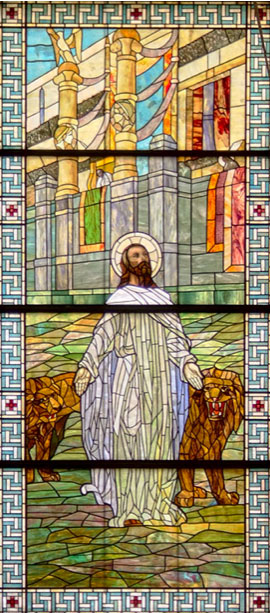Feast Day: October 17th

Peter had been the first apostle to reach the large Roman city of Antioch, north of Jerusalem, outside Judea, in Syria. It was a bustling, large, pagan place, the fourth largest city in the entire Roman Empire, and, with a population above 250,000, it was not only was double the size that Springfield is now, it was also a perfect place for the Gospel to begin its march out to the whole world. The Galilean fisherman must have already been overwhelmed by the distance the Word of Christ had come in those first years after the resurrection. Could he have imagined that that crazy city would be the first place the followers of Christ would be called “Christians”? How could he have predicted that within 10 years Paul and Barnabas would convert to Christianity, and would depart from that very city on their missions to the Greek-speaking world? Far less could he look 20 years ahead to his martyrdom in Rome itself, fulfilling Christ’s words back on the beach of the Sea of Tiberias, when Jesus told His beloved burly fisherman that “when you are old, you will stretch out your hands, and another will fasten your belt for you and carry you where you do not wish to go…” [John 21:18] Or, that in 200 years, 100,000 of those people in Antioch would be Christian.
But perhaps he knew a little boy named Ignatius.
Ignatius was a young child there in Antioch around the time that Peter was there, and as a good friend of a disciple of Peter, St. Polycarp, it is possible that Peter met him. Some even say that Peter picked the boy out to be his successor as bishop of Antioch one day. Either way, it is from his role as bishop of that important city, that Ignatius got his famous surname, “Ignatius of Antioch”. But I want to tell the story of another name he has: Ignatius Nurono, translated: Ignatius Fire-Bearer. Many attributes must have contributed to his having this nickname: his tireless proclamation of the Gospel, his lifelong witnessing to Christ’s resurrection, his fearless embracing of martyrdom … but I think above all this nickname came from his relentless proclamation that the piece of unleavened bread he held in his hands each Lord’s day, became Jesus Christ Himself in the Blessed Sacrament. He bore the fire of Christ in all his boldness, but never more than the humble consecration at Mass. It is not by chance that this is the man who would first use “Eucharist” to refer to Christ’s sacramental Body and Blood, nor that he first referred to the Church as “Catholic”, for to him these were just two parts of the same mysteries, two aspects of the same reality.
I write boldly to your love, which is worthy of God, and exhort you to have but one faith, and one preaching, and one Eucharist. For there is one flesh of the Lord Jesus Christ; and His blood which was shed for us is one; one loaf also is broken to all, and one cup is distributed among them all: there is but one altar for the whole Church, and one bishop, with the presbytery and deacons, my fellow- servants. Since, also, there is but one unbegotten Being, God, even the Father; and one only-begotten Son, God, the Word and man; and one Comforter, the Spirit of truth.
[St. Ignatius of Antioch, Letter to the Philadelphians, Chapter 4.]
The unity of the Church is found in the unity of her members around Christ, in His Vicar, and His bishops, but most of all in His Body and Blood. This is why the Eucharist is the “source and summit” of our faith, the foundation of all the sacraments, and the greatest treasure that we have. Every other sacrament streams out from this Most Blessed Sacrament: different gleams from the same Light, different gifts from the same Lord, different sparks from the same Fire.

Want unity? Want courage? Want faith? Want love? Rely on Christ in the Eucharist. Prepare yourself and your families to receive Him well. Bear that fire boldly. Ignatius did.
His last letter was written to the Christians of Rome, as he followed in St. Peter’s footsteps to his own martyrdom in the arena: “The only thing I ask of you is to allow me to offer the libation of my blood to God. I am the wheat of the Lord; may I be ground by the teeth of the beasts to become the immaculate bread of Christ.” [Letter to the Romans, Chapter 4]. May we too, by the intercession of St. Ignatius, be united, inspired, and transformed into the Immaculate Bread of Christ.
– Fr. Dominic Rankin, as of this writing, has celebrated the Holy Mass nine hundred and forty seven times, and has been re-ignited every time by a new flicker of the flame of love from Christ’s Heart that constantly seeks to set us all alight.